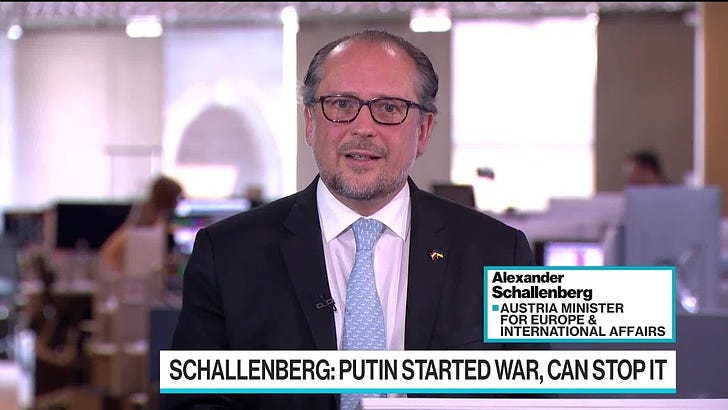Fabian Scheidler takes a look at the current state of Austrian neutrality. Neutrality is an important part of Austria’s official and popular identity, “a cornerstone of its international posture since 1955.”1 But, like other things in Austria’s official self-image, neutrality is a flexible concept that probably doesn’t mean what non-Austrians might think it means.
First, a reality check. Austria became a member of the European Union in 1995. “Just like NATO, the European Union has its own mutual defence clause,” Article 42.7 of the Treaty of Lisbon which took effect in 2009.2
On its face, the EU mutual-defense clause is in its diplomatic wording more explicit an obligation than that of NATO, of which Austria is not a member.
But in practice, the combined EU military forces are much smaller than those of NATO, which include the non-EU nuclear powers Britain and the US. NATO has an elaborate, formally integrated command and coordination structure. The EU equivalent is nominal in comparison.
The US has since the end of the Second World War pursued a policy of promoting economic and political cooperation within the EU but has always sought to prevent the EU from becoming a potential “peer competitor” to the US, wanting to keep the NATO as the most important European military alliance, which is in practice largely controlled by US policies.
Scheidler asks:
But what exactly does this [Austrian] neutrality look like? Defenders and opponents alike admit that, in practice, the rigid rule gets bent. For decades, Austria’s governments have tolerated NATO planes in their airspace, just as they allowed American tanks passage during the 1991 Gulf war.
Behind the façade of a steadfast principle, the concept of neutrality has evolved. Like Germany, Austria was divided into four occupied zones after the second world war. It dodged partition (the fate of its larger neighbour) by hammering out a deal with the Soviet Union in spring 1955, which guaranteed the country full sovereignty in exchange for a promise of ‘permanent neutrality’. Called the Moscow Memorandum, the pledge was a prerequisite for a state treaty brokered with the Soviet Union, US, UK and France that codified the country’s independence. Parliament passed the Constitutional Law on the Neutrality of Austria that October, and the Allied troops withdrew. [my emphasis]
That treaty is still in effect, but Austria never acknowledged present-day Russia as the legal successor state to the Soviet Union for purposes of that treaty. Even before that, Even before that, however, “In 1990 the country’s authorities even unilaterally declared several articles of the Austrian State Treaty obsolete in order to legitimise participation in EU military structures; the Soviet Union cried foul, but Western powers kept mum..”
During the Cold War, Austria’s neutrality allowed it to play an important role as a center of activity in coordinating between the NATO and Warsaw Pact nations. Its reputation as a hotbed of Soviet espionage and dubious East-West financial shenanigans was based in the realities of those times.
The widely celebrated embrace of neutrality became a pillar of Austria’s identity, and remains associated with one figure: Bruno Kreisky who served as undersecretary of state (1953-59), foreign minister (1959-66) and chancellor (1970-83). A Social Democrat, Kreisky forged a technique later called ‘active’ or ‘engaged’ neutrality (5), visiting Bulgaria, Romania and Hungary in the 1960s ‒ a first for a Western foreign minister. In so doing, he paved the way for Germany’s policy of détente, soon implemented by that country’s chancellor Willy Brandt (1969-74), a close friend of Kreisky’s from their shared exile in Sweden during the second world war.
Kreisky was also instrumental in arranging the Conference on Security and Co-operation in Europe (CSCE), held between July 1973 and August 1975 in Helsinki and Geneva, as well as in writing the Helsinki Declaration (signed 1 August 1975); the conference and declaration both shaped the détente’s institutional framework. When the CSCE became the Organisation for Security and Co-operation in Europe (OSCE) in 1995, it set up shop in Vienna, already home to numerous United Nations agencies that Kreisky had helped bring to Austria. Being a diplomatic hub offers Austria not only international kudos but also a sort of ‘negative security assurance’ (a commitment by nuclear-armed states not to carry out a strike on a non-nuclear state).
A more diplomatically adroit Austrian government than the current one headed by Karl Nehammer of the conservative, Christian Democratic People’s Party (ÖVP) might be able to exploit Austria’s history as a bridge-building neutral nation to enhance the country’s foreign policy clout, the end of the Cold War effectively drastically diminished Austria’s opportunities for playing such a role.
Austria has benefitted in recent decades from its business ties to Russia. But those opportunities have now been affected by the New Cold War context initiated by Russia’s 2022 invasion of Ukraine. Still, as of July 2023:
Most European countries have reduced their dependence on Russian gas since the beginning of its full-scale invasion of Ukraine.
Not so in Austria.
The Central European country increased its imports by up to 80 per cent in January, according to the Climate Ministry. …
Austria has imported 7 billion euros worth of gas from Russia since Moscow's invasion of Ukraine began last February, according to the [Austrian Energy] ministry.
More money is currently transferred from Vienna to Russia for gas than the total amount of aid spent on Ukraine by Austria since the start of the war.3 [my emphasis]
Here’s Austria’s current Foreign Minister, Alexander Schallenberg, who also served briefly as Austria’s interim Chancellor (head of government) in 2021, in a June appearance4:
Scheidler, Fabian (2023): Austria: neutral for how much longer? Le Monde Diplomatique English, Sept. 2023. <https://mondediplo.com/2023/09/07austrian> (Accessed: 2023-06-09).
Tidey, Alice (2023): Like NATO, the EU has a mutual defence clause but trust appears low. Euronews 07.06.2022. <https://www.euronews.com/my-europe/2022/06/07/like-nato-the-eu-has-a-mutual-defence-clause-but-trust-appears-low> (Accessed: 2023-06-09).
Hajdari, Una (2ß23): Austria imports of Russian gas hit pre-war levels, exceeding aid to Ukraine. Euronews 12.07.2023. <https://www.euronews.com/2023/07/12/austria-imports-of-russian-gas-hit-pre-war-levels-exceeding-aid-to-ukraine> (Accessed: 2023-06-09).
Austria Urges Caution on Seizing Russian Assets. Bloomberg Television YouTube Channel 06/21/2023. (Accessed: 2023-06-09).


